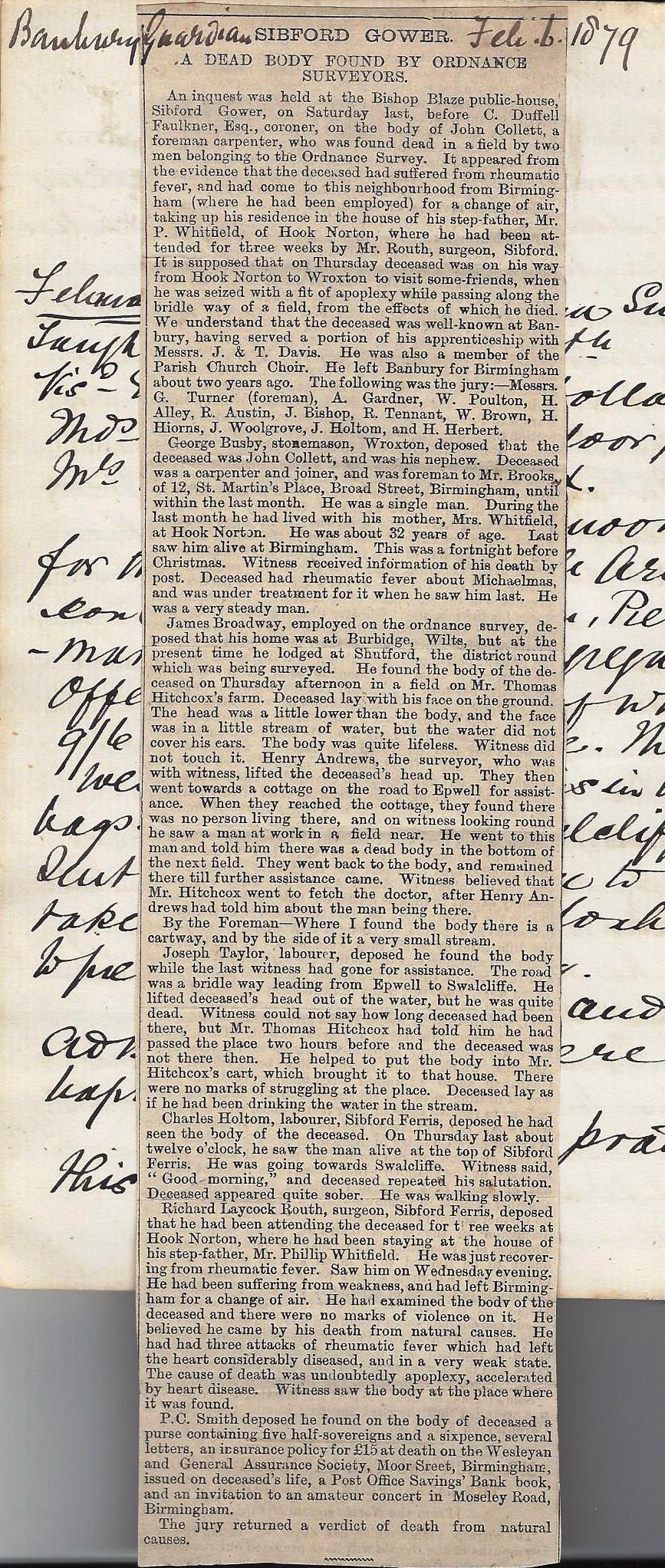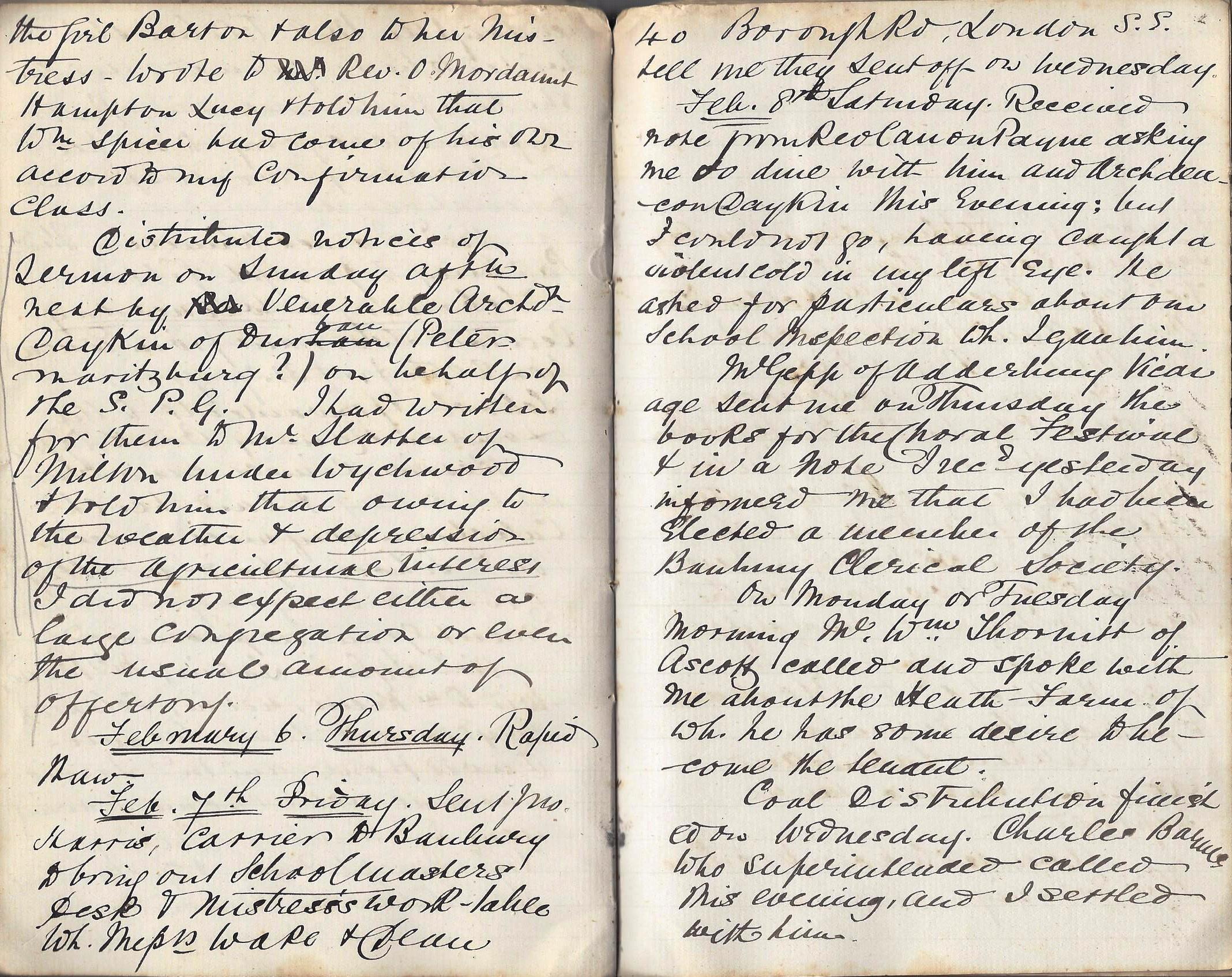1879, February 6, Thursday
Rapid thaw.
From the Banbury Guardian, 6th February, 1879:
SIBFORD GOWER.
A DEAD BODY FOUND BY ORDNANCE SURVEYORS.
An inquest was held at the Bishop Blaze public-house, Sibford Gower, on Saturday last, before C. Duffell Faulkner, Esq., coroner, on the body of John Collett, a foreman carpenter, who was found dead in a field by two men belonging to the Ordnance Survey. It appeared from the· evidence that the deceased had suffered from rheumatic fever, and had come to this neighbourhood from Birmingham (where he had been employed) for a change of air, taking up his residence in the house of his step-father, Mr. P. Whitfield, of Hook Norton, where he had been attended for three weeks by Mr. Routh, surgeon, Sibford. It is supposed that on Thursday deceased was on his way from Hook Norton to Wroxton to visit some friends, when he was seized with a fit of apoplexy while passing along the bridle way of a field, from the effects of which he died. We understand that the deceased was well-known at Banbury, having served a portion of his apprenticeship with Messrs. J. & T. Davis. He was also a member of the Parish Church Choir. He left Banbury for Birmingham about two years ago. The following was the jury:-Messrs. G. Turner (foreman), A. Gardner, W. Poulton, H. Alley, R. Austin, J. Bishop, R. Tennant, W. Brown, H. Hiorns, J. Woolgrove, J. Holtom, and H. Herbert.
George Busby, stonemason, Wroxton, deposed that the deceased was John Collett, and was his nephew. Deceased was a carpenter and joiner, and was foreman to Mr. Brooks, of 12, St. Martin’s Place, Broad Street, Birmingham, until within the last month. He was a single man. During the last month he had lived with his mother, Mrs. Whitfield, at Hook Norton. He was about 32 years of age. Last saw him alive at Birmingham. This was a fortnight before Christmas. Witness received information of his death by post. Deceased had rheumatic fever about Michaelmas, and was under treatment for it when he saw him last. He was a very steady man.
James Broadway, employed on the ordnance survey, deposed that his home was at Burbidge, Wilts, but at the present time he lodged at Shutford, the district round which was being surveyed. He found the body of the deceased on Thursday afternoon in a field on Mr. Thomas Hitchcox’s farm. Deceased lay with his face on the ground. The head was a little lower than the body, and the face was in a little stream of water, but the water did not cover his ears. The body was quite lifeless. Witness did not touch it. Henry Andrews, the surveyor, who was with witness, lifted the deceased’s head up. They then went towards a cottage on the road to Epwell for assistance. When they reached the cottage, they found there was no person living there, and on witness looking round he saw a man at work in a field near. He went to this man and told him there was a dead body in the bottom of the next field. They went back to the body, and remained there till further assistance came. Witness believed that Mr. Hitchcox went to fetch the doctor, after Henry Andrews had told him about the man being there.
By the Foreman—Where I found the body there is a cartway, and by the side of it a very small stream.
Joseph Taylor, labourer, deposed he found the body while the last witness had gone for assistance. The road was a bridle way leading from Epwell to Swalcliffe. He lifted deceased’s head out of the water, but he was quite dead. Witness could not say how long deceased had been there, but Mr. Thomas Hitchcox had told him he had passed the place two hours before and the deceased was not there then. He helped to put the body into Mr. Hitchcox’s cart, which brought it to that house. There were no marks of struggling at the place. Deceased lay as if he had been drinking the water in the stream.
Charles Holtom, labourer, Sib ford Ferris, deposed he had seen the body of the deceased. On Thursday last about twelve o’clock, he saw the man alive at the top of Sibford Ferris. He was going towards Swalcliffe. Witness said, “Good morning,” and deceased repeated his salutation. Deceased appeared quite sober. He was walking slowly.
Richard Laycock Routh, surgeon, Sibford Ferris, deposed that he had been attending the deceased for three weeks at Hook Norton, where he had been staying at the house of his step-father, Mr. Phillip Whitfield. He was just recovering from rheumatic fever. Saw him on Wednesday evening. He had been suffering from weakness, and had left Birmingham for a change of air. He had examined the body of the deceased and there were no marks of violence on it. He believed he came by his death from natural causes. He had had three attacks of rheumatic fever which had left the heart considerably diseased, and in a very weak state. The cause of death was undoubtedly apoplexy, accelerated by heart disease. Witness saw the body at the place where it was found.
P. C. Smith deposed he found on the body of deceased a purse containing five half-sovereigns and a sixpence, several letters, an insurance policy for £15 at death on the Wesleyan and General Assurance Society, Moor Street, Birmingham, issued on deceased’s life, a Post Office Savings’ Bank book, and an invitation to an amateur concert in Moseley Road, Birmingham. The jury returned a verdict of death from natural causes.

5 Feb 1879

